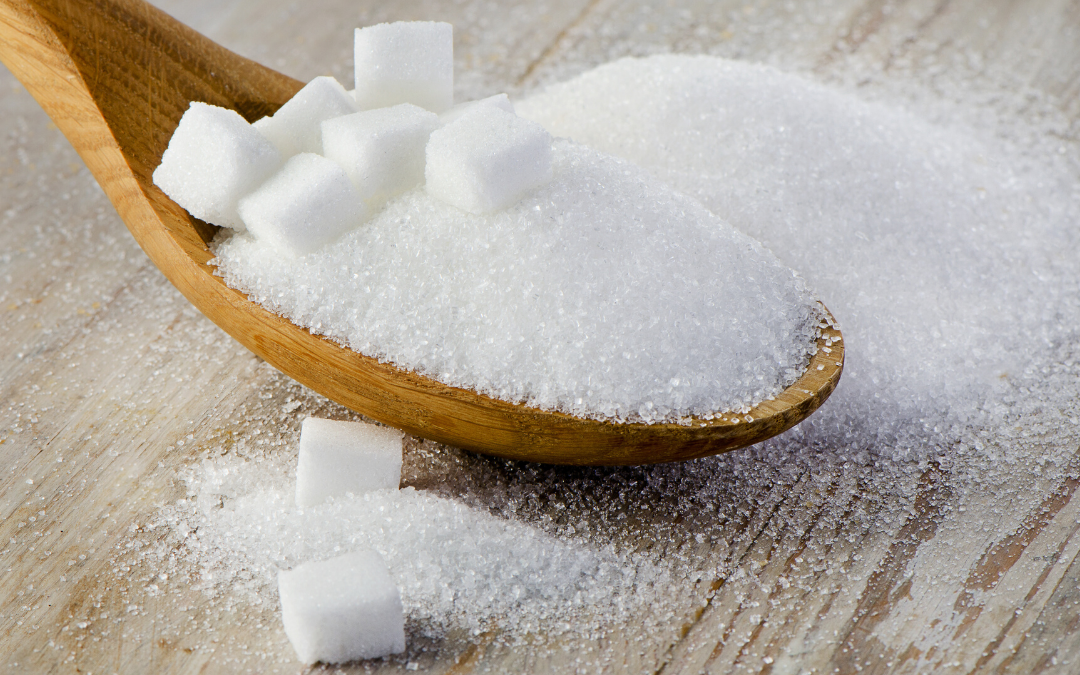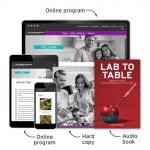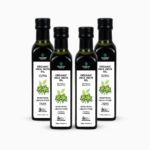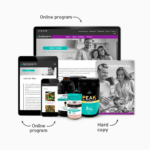First it was salt, then it was fat and now it’s sugar. Sugar is the new food to avoid and over the past couple of months I’ve been called by many major newspapers and radio programs to talk about sugar and how it has now fallen into disrepute.So what’s my take on it? Firstly, we are always looking for the magic bullet to stop the obesity and sickness epidemic. We’ve made salt and fat the scapegoat and that hasn’t worked, so let’s now implicate sugar as the guilty food. There is no magic bullet or magic pill or magic food that will stop the mental and physical degrade of humans eating a western diet. It will be a lifestyle change that makes the difference as well as looking at quality of foods rather than always pointing the finger on the quantity we are eating.
To implicate fat, salt and sugar as the disease mongers of the 20th and 21st century is ludicrous. These three foods have been essential to our survival for eons. Just the right amount of salt told us when grains, grasses and vegetables were ready to be eaten. When the right salt taste had been reached, it was more desirable for us to eat, but it also was the point at which these foods had maximum nutrition. When our soils were rich in minerals (salt) our foods had a very different taste, we didn’t need to salt grains to make them more palatable they already had their fill of salt. These days our soils are depleted in salt and so we add it in order to reach the bliss point for our taste buds and our evolutionary palate.
Fats were also important for our survival, foods high in fat were a quick source of energy plus they gave us satiety and allowed us to go longer between food sources.
Sugar is no different to salt. Just the right amount of sweetness in fruit signals the food is ripe and ready to eat. When you pick a fruit that is not ripe, it is sour or bitter in taste, leaving a furry dry feeling in the mouth, which you will spit out immediately. But when a fruit is ripe the sugar has increased so that your taste buds are delighted rather than assaulted. This is the point when fruit is at its maximum nutrition and best for our survival.
So you can see that fat, salt and sugar have been instrumental in our survival, so why are they implicated as the problem in our health demise and the obesity epidemic. It’s what they have done to these foods that is the problem, the refinement process is a guilty party as is the laboratories that create fake substances that make us believe we are eating real fat, salt and sugar.
Because sugar is the latest guilty party let’s have a look at what science, technology and the food industry has done to it. I’ve dissected sugar into 4 groups.
Four Groups of Sugar
1. Artificial Sweeteners
2. Man made Sugars
3. Processed, Refined and Extracted Sugar and Sweeteners
4. Natural Sugars
1. Artificial sugars first came into vogue when the theory of calorie in, calorie out became the mantra for the obesity epidemic and the weight loss industry. A lot of weight was put on this theory (pun intended) and as sugar had calories and everyone loved sugar, the artificial sugar industry was born. Since that time many artificial, one calorie sugars have been banned due to their association with nervous system problems and some cancers. I write about this more in my book
Lab To Table and exactly how they have effected our health despite being just one calorie. I’m very dubious about these sweeteners and choose not to consume them. The problem is, is that they are in not only foods, but medications, toothpastes, chewing gums and vitamins and minerals, so it’s important to be aware of how they have infiltrated all these industries. I choose not to be part of a human experiment that we may not know the full extent of these artificial sweeteners on our health for years to come. One thing I do know is that some artificial sweeteners cause us to crave carbohydrates, so while you may have a diet drink in one hand, in the other you’ll crave a sugary doughnut. Just be aware that there are many new artificial sweeteners coming on the market with all sorts of new names. So as a good rule of thumb, stay away from them until you know exactly how they are made and what long term research has been done on them.
2. Man made – This group of sugars includes; dextrose, glucose, fructose, high fructose corn syrup, maltose, maltodextrin, xylitol to name a few. These sugars are primarily made from wheat and corn which could be genetically modified, they are produced in a chemical laboratory and are, as a group, around 40% cheaper than plain old sugar (also known as sucrose). In nature, simple sugars are never found alone, they are always surrounded by other simple sugars, amino acids, fats and vitamins and minerals. For instance sucrose (sugar) is a mix of fructose and glucose). There are several reasons I don’t consume these sugars, firstly because they could be genetically modified and once again I don’t want to be part of some giant human experiment with GM foods, secondly they are not made by food. They may begin as a food but through a bunch of chemical reactions they become a simple sugar and I’m not prepared to eat them no matter how safe I’m told they are.
3. Processed, Refined or Extracted – I am a nature girl, I like foods that my ‘evolutionary body’ has thrived on for thousands of generations. I know my body has evolved to eat these foods and even though I live in a very modern life, my ‘evolutionary body’ has not been able to adapt to all the new foods that have been introduced in the last 30 plus years. Refining of natural foods also is something that I’m not totally happy with, because the more we refine a food the less it is in its natural state and the less it is like what my ‘evolutionary body’ needs for survival.
White sugar may be from a natural source, but it is 99.4% sucrose and .6% ash, in other words it is stripped of all the macro and micro nutrients that the sugar cane and sugar beet (non GM) naturally has. Anything that refined does not come under the category of quality foods for the body. Natural sugars that I do like and that are in their natural state or as close as possible are; organic maple syrup, rapadura sugar, coconut sugar and sugar juice (juice of the sugar cane). These are sugars that I use in my cooking, although I don’t use them in excess they are in my pantry, or I would consider to have in my pantry. Many people ask me about agave, yakon and rice syrup. At this point the jury is still out for me. I know where honey, maple syrup, rapadura, coconut and sugar juice come from, I know that I can make them in my own kitchen or collect them from nature, whereas, agave is from cactus, yakon from a root vegetable and rice syrup from rice. I don’t know how to make these (but that just may be ignorance on my part), and I don’t know if I can make them easily in my kitchen or do I need some special industrial process to do it. At this point I steer clear of these sugars until I know better. I’m cautious when it comes to new foods as sometimes they are bought out as a health food and marketed well but they may not be. For instance I remember when I was first getting into healthy eating, lecithin was seen as a health food, but as I began to look more into how it was made and that it could be from GM soy the more I realised it was perhaps something that is not worthy to be a part of a healthy diet.
4. Natural – This is the pick of all the sugars, natural sugar has not been processed in anyway this includes raw honey, sugar in fruit and root vegetables, dried fruits (without dextrose, vegetable oil or rice flour added) and stevia leaf (straight from the herb bush) or chomping on some sugar cane or beets. These are the sugars that our body can use, these are the sugars that have other benefits other than just to sweeten a food or give us energy. For instance raw honey has natural antimicrobial properties, it is filled with probiotics and has the ability to heal wounds. Honey is also rich in nutrients and can be a wonderful addition to a diet. Fruit has benefits for health, seasonal fruits have the ability to help hormones (insulin and leptin) to guide the body to store fat or use fat for survival. The problem is that we no longer know our seasonal fruits, as many fruits are shipped from the northern hemisphere to the southern hemisphere and visa versa all year round. Traditionally summer fruits are higher in sugar than winter fruits and there is good reason for that which I won’t go into now, but you can read about in the The Fat Loss Protocol.
Sugar has it’s place in the diet, but many people have abused this food, by eating mainly from the first two groups or the refined version of group 3 (white, raw or brown sugar). The Heart Foundation of Australia has no guidelines for sugar, many of their foods which have the infamous tick are filled with sugar, up to 70% I’ve seen in some of their products. Sugar, obesity and heart disease are definitely linked but it is the abuse of sugar that is the problem as well as the quality of sugar rather than the natural sugars of group 4.
If you are someone who is addicted to sugar or has eaten way too much, then sugar is your enemy and you would be wise to avoid it until your taste buds come back to not needing the over sweet stimulation. For people who eat a whole food diet with occasional indulge in the unrefined group 3 and enjoy seasonal fruit and other sweet foods of group 4, then you’re on the right path. I do enjoy my sweet fruits and my beautiful sweet foods that I make, but they are a part of a diet that is filled with green leafy vegetables, meats, fish, poultry, eggs, fats, natural dairy, nuts and seeds, cacao with occasional quinoa and other grains. Sugar is not the enemy, it is the quantity, lack of quality and abuse that makes it a food that must be treated with caution in this modern day. But to say that sugar as a whole is bad and must be avoided at all costs, is to simplify what I believe to be something much more complicated. Changing Habits sells Organic Rapadura Sugar and from this sugar you can make many healthy foods, such as homemade dark chocolate, chia cake, these are only two recipes that are found in my 69 Shades of Chocolate Recipe book, as well as make the beautiful Maleo (Rapadura Syrup)









0 Comments